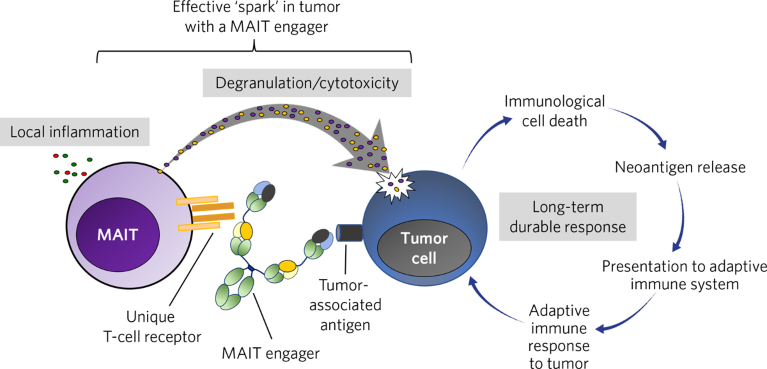Bi- and multi-specific antibodies hold enormous promise for the next generation of precision cancer immunotherapies as they enable novel mechanisms of action such as redirecting T cell activation, modulation of receptor signalling, and simultaneous targeting of multiple immune checkpoint receptors. However, dose-restricting side effects limit their therapeutic window, and some mechanistic and technical challenges slow down the development of safe, effective and scalable therapeutics. Solving these issues is the objective of Biomunex Pharmaceuticals, a biopharmaceutical company pioneering a new generation of innovative bi- and multi-specific immunotherapies. Using its proprietary BiXAb platform, Biomunex is accelerating timelines and enabling previously unattainable therapeutic strategies, notably through its disruptive mucosal-associated invariant T cell (MAIT) engager approach.
Next-generation antibody technology: versatility, speed and precision
Using a proprietary computational modelling approach, Biomunex has created a bi- and multi-specific tetravalent antibody platform, BiXAb. The platform has a robust plug-and-play design that allows the rapid assembly of fully human, immunoglobulin G (IgG)-like antibodies: Fragment antigen-binding regions (Fabs) from any pair of monoclonal antibodies can be incorporated into a tetravalent IgG scaffold with proprietary linkers and mutation sets to enable correct Fab chain pairing.
The resulting antibodies are biologically robust, exhibit natural drug-like properties (similar to a normal IgG), excellent thermal stability, with minimal aggregation and immunogenicity. The platform can generate whole panels of BiXAbs to a particular target in as little as four weeks with minimal engineering, and they are highly manufacturable in Chinese hamster ovary (CHO) cells and suitable for clinical development.
“The BiXAb platform produces antibodies that retain high-affinity binding through avidity effects, even against targets with low expression,” said Simon Plyte, CSO. “The platform may also support multi-specific capabilities, enabling development of antibodies that may simultaneously engage three or more targets—unlocking powerful immunological strategies previously inaccessible with standard formats.”
Biomunex has built an extensive pipeline of BiXAb-based clinical candidates targeting a wide range of cancers. The first BiXAb bispecific antibody, which targets two immune checkpoints, is currently in phase 1 trials as a first-in-class approach to treat cancer.
MAIT engagers: providing a therapeutic window to treat solid tumors
A major innovation from Biomunex is the development of the world’s first MAIT engagers, a novel class of T-cell engagers (TCEs) that target MAITs to kill cancer cells. Discovered some 25 years ago by Olivier Lantz, co-inventor of MAIT engagers with Biomunex, MAIT cells are a unique subset of cytotoxic unconventional T cells that are tissue/tumor infiltrating—making them ideally suited for cancer immunotherapy. Using the BiXAb platform, Biomunex is able to engineer anti-bodies that uniquely bind MAIT cells and bridge them to tumor-associated antigens, creating a potent immunological synapse. This induces MAIT cells to kill cancer cells through directed cytotoxicity, degranulation and immune stimulation.
Moreover, because MAIT cells are found in high numbers in blood and solid-tumor tissue, their selective activation by MAIT engagers in tumors initiates primary tumor-cell killing. This leads to a secondary immune response, through tumor-neoantigen release and epitope spreading, and will elicit a long-term durable response—the so-called ‘spark effect’ (Fig. 1).

Fig. 1 | The ‘spark effect’. The bispecific MAIT engager antibody binds simultaneously to a tumor-associated antigen (TAA) and the unique MAIT T-cell receptor, leading to activation, degranulation and killing of the tumor (the ‘spark’). Immunological cell death produces cancer neoantigens that elicit a new adaptive immune response directed towards the tumor. MAIT, mucosal-associated invariant T cell.
Crucially, MAIT engagers solve some of the limitations of conventional TCEs: Classic CD3+ TCEs non-selectively activate all T-cell subsets, often leading to potentially fatal cytokine release syndrome, and increased local immunosuppression in the tumor microenvironment. In contrast, MAIT engagers selectively activate only MAIT cells, resulting in a potent anti-tumor effect without cytokine release or regulatory T-cell activation, enabling a larger therapeutic window, higher dosing potential and safer administration.
“Data confirm that MAIT engagers are a novel, safe and potent potential new treatment for cancer that could be a real game changer,” said Plyte. “An efficient ‘spark effect’ initiated by MAIT engagers means they are more effective and safer than other TCEs, opening the door to long-term durable responses for the treatment of solid tumors.”
Partner with Biomunex
Demonstrating its ability to deliver technology and therapeutics of major value/interest to the pharmaceutical industry and cancer patients, Biomunex established a platform-based agreement with Sanofi in 2019, and a product deal with Onward Therapeutics in 2021. In addition, Biomunex recently (December 2024) out-licensed the world’s first MAIT engager targeting GPC3 to Ipsen for clinical development. In parallel, the company continues to collaborate with several major academic institutions, including Institut Curie in France and the University of Kiel in Germany, in the development of innovative immunotherapeutics.
Biomunex is actively advancing its own pipeline but remains open to strategic partnerships. “Our revolutionary technology enables us to discover and develop immunotherapies for multiple cancer types,” said Pierre-Emmanuel Gerard, CEO. “With our best-in-class bispecific antibody platform, pioneering MAIT engager programs, and strong scientific and commercial validation, we are poised to lead the next generation of immuno-oncology therapies”.


